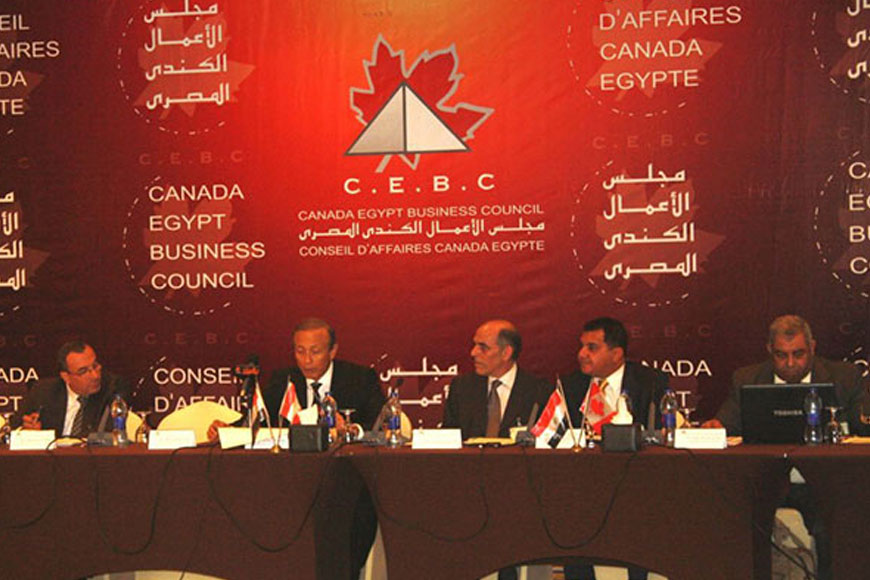
Date
Speaker(s)
Dr. Mosaad Hashim,Dr. Mostafa El Bahr
Dr. Abdel Aal Hassan Attia
Dr. Muhammad Zaher
Designation
Description
The Egyptian Mineral Resources, Applying Global Benchmarks to National Legislations
Special roundtable discussion featuring H.E. Abudallah Ghorab, Former Minister of Petroleum and Mineral Resources
The Canada Egypt Business Council (CEBC) hosted a special roundtable discussion featuring H.E. Abudallah Gohrab, former Minister of Petroleum and Mineral Resources on September 16, at the Grand Nile Tower Hotel. The Minister was joined with Dr. Mosaad Hashim, Chairman of the Egyptian Mineral Resources Authority, Dr. Mostafa El Bahr, also the former chairman of the latter organization, Dr. Abdel Aal Hassan Attia, the geological expert and consultant in the Industrial Development Authority and Dr. Muhammad Zaher, Chairman of CEBC’s Mining Committee and President of Z-Gold Resources. The discussion revolved around the future of the sector, its lost potential and ways of putting it on the right track.
Over 300?distinguished attendees were present at the event. The attendees were mainly entrepreuners and experts in the mining field, more prominently ***, and *** were among the attendees. VIPs were not welcomed in the recording.
CEBC Chairman, Mr. Motaz Raslan, delivered the opening remarks for the discussion. Raslan said that this event, along with others to come, is a shift by the Council towards the economy, which is “the path towards progress and development for this nation.” He said that the mineral resources sector has been chosen as a beginning for this series, which will focus on “getting the production wheel” rolling once more after June 30 revolution. The Chairman expressed his confidence that this sector, which did not receive sufficient attention in the past, could be Egypt’s way out of the bottleneck. He added that the discussion aimed at identifying challenges and solutions facing the sector, in order for it to achieve its potential.
Dr. Abudallah Ghorab, former Minister of Petroleum and Mineral Resources, assumed the floor following Mr. Raslan. Dr. Ghorab agreed with Mr. Raslan that it is time to shift attention and efforts towards the economy, something that has been in stalemate since the January 25 revolution of 2011. He added that unless people feel tangible improvement in the economy, the people would suffer even more frustration. The former minister lamented the situation of Egypt at the moment, whom he described as historically unacceptable. Dr. Ghorab said that Egypt has not yet utilized not even 1% of its mineral resources.
The former minister tackled several challenges facing the sector. He briefly touched on structural, bureaucratic and legislative obstacles, which hinder the development of the sector. On legislation for instance, Dr. Ghorab said that the final amendment to the legislation pertaining to mining was in 1956, which is outrageously outdated.He mentioned several areas in Egypt, which are rich in minerals and are not being harnessed. He added that mining is a labor-intensive sector and highlighted that as such it fulfils one of Egypt’s direst needs during the current period. He said that there has been a tendency not to take any executive decision since the January revolution, which delayed the development of the sector markedly. He also said that El Sokary Gold Mine should be an example repeated in several places due to the number of people it employs, despite the controversy stirred around it in its earlier days. He added that there has to be the courage to take decisions; ones that are to be taken with the adequate checks and balances.
The former minister criticized Egyptian intransigence to partner with foreign parties in the framework of agreements. He said that there has been reluctance to forge agreements, in fear that it would be at a loss for Egypt. However, the Dr. Ghorab pinpointed that some activity is better than no activity and no profit at all for the country.Dr. Ghorab also spoke of the importance to spread awareness regarding Egypt’s mineral resources.
Dr. Mostafa El Bahr, the Chairman of Ageeba for Petroleum, and the former Chairman of the Egyptian Mineral Resources Authority, also gave a brief word on the sector. He commenced his word saying that Egypt as a nation needs, “the government to reconcile with the government!” Dr. El Bahr spoke of the fear to take decisions by officials, saying that this springs from fear of criticism. He added that public opinion only focuses on the mistakes of an official and not the positive steps he had taken, which drives officials to opt for not taking any decisions that entail any degree of risk. Dr. El Bahr said that it is the time for ‘revolutionary decisions’. Dr. El Bahr also mentioned other challenges including the research-oriented structure of the Mineral Resources Authority, which he says has hindered its performance and kept it a step behind other institutions in Egypt.
Dr. Muhammad Zaher, Chairman of CEBC’s Mining Committee and President of Z-Gold Resources, gave a presentation on the mining sector in general. He started off saying that the times of depending on the State are over, and that entrepreneurs need to take initiative for the development of the sector. He also gave a brief historical overview of the Egyptian Mineral Resources Authority. Dr. Zaher went on to say that the mining business is one that is “very high risk and very long term.” He asserted that resistance witnessed by mining projects, such as the El Sokary Gold Mine, terribly affects the prospects of international partnerships in the field. Dr. Zaher also highlighted the Canadian prominence in the field, as he stated that 75% of mining companies worldwide are registered in Canada. He also said that Toronto Stock Exchange raised one third of all funds going into mining between 2007 – 2011single-handedly.
Dr. Abdel Aal Hassan Attia, the geological expert and consultant to the Industrial Development Authority, assumed the floor and also gave a presentation on the field. He said that Egypt is going through a turning point. He described the mineral resources sector as Egypt’s only remaining hope. Dr. Attia said that Egypt has plenty of resources, which has spectacular capacity. He criticized that until this moment, Egypt has established multiple industrial cities, none of which is based on utilizing Egypt’s mineral resources. He also lamented that Egypt is importing raw materials, which can be quite easily produced in the country. He said that the problem lies in the “State fighting itself,” concurring with the previous speakers on the executive branch challenges.
The floor was opened for questions and comments. Some of the attendees suggested solutions to the challenges facing the sector; others discussed the prospect of agreements and the fairness of the existing ones. However, there seemed to be almost unanimous agreement among the distinguished attendees that there needs to be a radical shift in government policy, accompanied by awareness that stops the inhibition of investment in the field.











